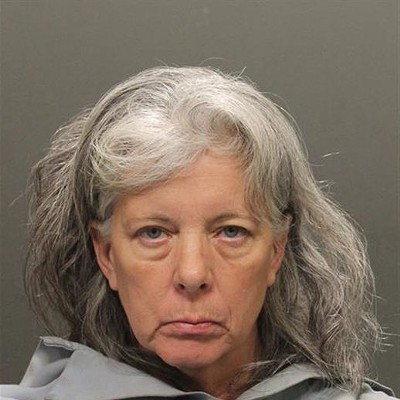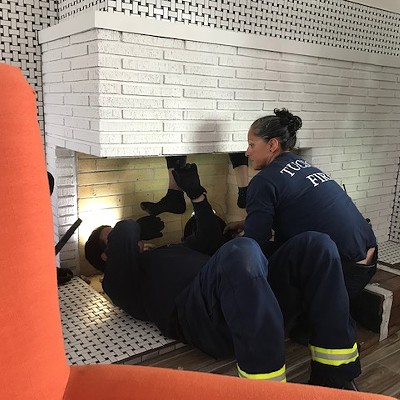But despite Border Patrol claims to the contrary, an investigation of these allegations may never have occurred. Or if it did, perhaps the results were too embarrassing for public consumption.
Either way, after a dizzying two months and several dozen phone calls, the Tucson Weekly has been unable to learn which government agency actually conducted the probe--or whether the investigation transpired at all. This failure denotes either outright stonewalling by the U.S. Department of Homeland Security--parent agent to the Border Patrol--or a startling level of federal ineptitude.
Meanwhile, for acting on his conscience, Cruz was apparently railroaded on federal charges. And today, he's still fighting to get his job back.
Cruz was a senior patrol agent in 2004, when he began dispatching memos to his superiors at the Douglas Border Patrol station. Those messages detailed his concerns that immigrant detainees were deliberately being shoehorned into overcrowded cells, even when other nearby cells remained empty.
He alleged that immigrants--including pregnant women, children and the elderly--sometimes went for 20 hours without food. Cruz wrote of lackadaisical screening of non-Mexican immigrants, and of lax security that allowed knives and guns into cells.
Perhaps most disturbing was his description of the haphazard treatment of minors, in a border region where trafficking in children is believed widespread. Agents routinely released unaccompanied minors "to anybody who claims that they are this person's father, uncle or guardian," Cruz told the Weekly in 2005. "It's a regular practice." His allegations were substantiated to the Weekly by another agent, who requested anonymity.
In response to his allegations, Cruz was chastised by superiors, or his memos were simply ignored. He was assigned to demeaning library duty. And despite his stellar record, he suddenly began receiving scathing employee evaluations.
Soon, the apparent targeting of Cruz grew more determined. In July 2005, he was indicted for allegedly bringing an illegal immigrant through the Douglas port of entry on a cold January night. The immigrant, a woman, was well-known on the Douglas Border Patrol social scene, and recently had been dating an agent. Another agent was also in the car with Cruz that night. However, only Cruz was arrested for transporting an alien. In March, a Tucson federal jury acquitted him of all charges. (See "Beating the Rap," March 29.)
According to court documents, in May 2004, U.S. Rep. Raúl Grijalva, D-Ariz., called for a federal investigation, based on the detainee-mistreatment claims raised by Cruz. Responsibility for that inquiry fell to the Department of Homeland Security's Office of Inspector General, or OIG.
And after the acquittal of Cruz this spring, Tucson Sector official Gus Soto told the Arizona Daily Star that an investigation was indeed being handled by the OIG.
But three years into this supposed probe, none of the federal agencies contacted by the Weekly were able to tell us who was conducting the investigation, or where the results might be found. Nor did Soto return phone calls from this newspaper to clarify his comments.
On July 18, the Weekly requested information about the probe from Tamara Faulkner, spokeswoman for Homeland Security's OIG. On July 24, Faulkner sent an e-mail reply, urging this reporter to file a Freedom of Information Act request. "You can send your request via e-mail to our OIG FOIA Unit ..." she wrote.
Three days later, however, Faulkner left this voicemail: "In this case, the complaints were ... referred to (the) U.S. Immigrations and Customs Enforcement Office of Professional Responsibility. ... That was done some time ago."
At that point, the Weekly attempted to cut the process short, by directly contacting the Tucson Sector, where the investigation purportedly took place.
Agent Sean King, a sector spokesman, fielded the call. "I've checked upstairs," he said, after meeting with his superiors. "They aren't going to comment."
Instead, King referred us to another Border Patrol spokesman, Agent Lloyd Easterling, in Washington, D.C. Over several days, Easterling referred this reporter to nearly every agency within the U.S. Department of Homeland Security--including back to the OIG and Tamara Faulkner. "I asked around here, and nobody's heard of (the investigation)," Easterling said.
After our fourth phone call, Agent Easterling got testy. "It's not my job to do a reporter's legwork for them," he said. Then he referred us back to the Tucson Sector headquarters. "If anyone would know, they'd be the ones."
That advice proved fruitless. Again, Agent King was asked if an investigation actually took place. "I assume it did," he said, "but you'd have to talk to (the Office of Professional Responsibility) and the OIG. I'm not stonewalling. I was told you have to contact D.C. for information."
As directed by King and Tamara Faulkner, the Weekly then contacted the U.S. Immigration and Customs Enforcement (I.C.E.) Office of Professional Responsibility.
But later that day, oddly, we received a return call from Carmela Cowgill, executive officer for the OPR--in the Department of Justice. Cowgill then directed us to Brian Roehrkasse, the DOJ director of public affairs.
Roehrkasse seemed irritated by the Weekly's call. "OPR only conducts investigations on DOJ attorneys," he said. With regards to Agent Ephraim Cruz, "you're talking about an individual who is one, not an attorney, but also is not within the Department of Justice. I would refer you back to the DHS Office of Special Responsibility or ... I don't have Tamara (Faulkner's) number, but I would try her."
Instead, on Aug. 16, we called I.C.E. headquarters in Washington, D.C., and reached spokesman Michael Keegan. The spokesman assured us he'd delve into the matter post-haste. Five days later, we called again. That afternoon, the Weekly was contacted by Vincent Picard, an I.C.E. spokesman in Phoenix.
"I'm going to thread through this," said Picard by phone. "You don't want to FOIA if they're just going to tell you they don't have the information."
About a week later, after reportedly coordinating with I.C.E. officials in Tucson, Picard referred the Weekly to the U.S. Customs and Border Protection Office of Internal Affairs. But Howard Taksey, an internal affairs supervisor, said his office doesn't handle such investigations.
Finally, the Weekly called Tamara Faulkner on Aug. 31 and again on Sept. 10, with a renewed request for information. We're still awaiting a reply.
So three years after Agent Cruz raised very serious allegations about the treatment of immigrant detainees, it remains unclear whether his concerns were ever investigated--or whether the possible abuse of detainees by the Border Patrol continues today.












